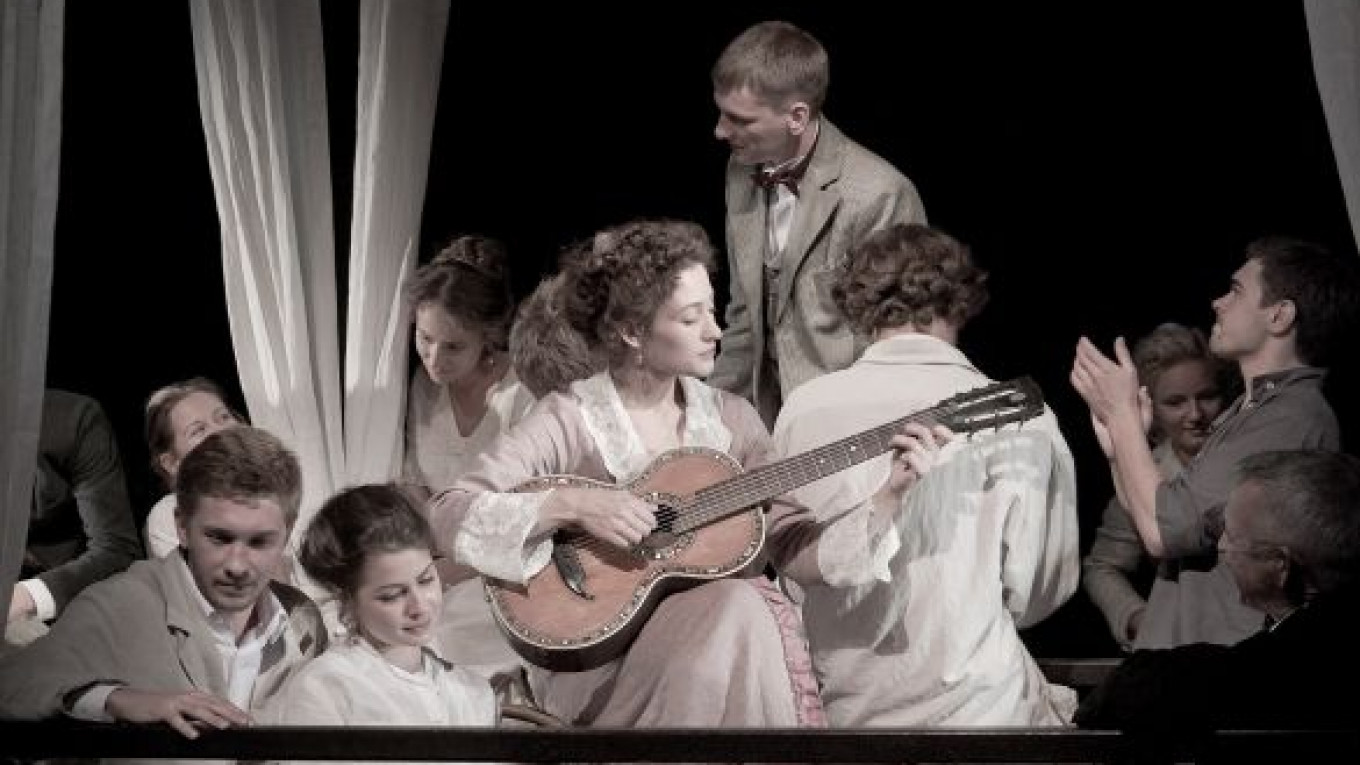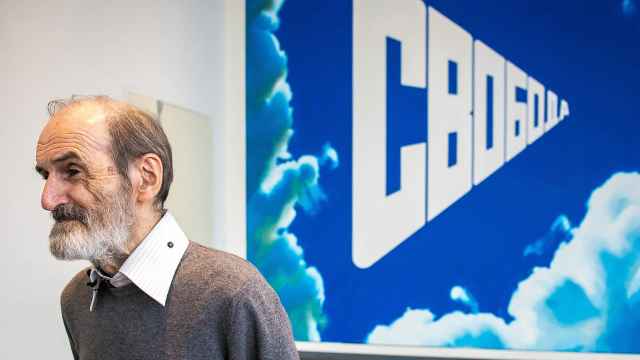If I were pressed to boil down the essence of Sergei Zhenovach’s Studio of Theatrical Art to a single quality, it would probably be the director’s desire to express theatrically “the human touch.”
Through authors such as Andrei Platonov, Nikolai Leskov, Fyodor Dostoevsky, Nikolai Gogol and Anton Chekhov, Zhenovach takes on timeless literary and philosophical topics: rebellious youth, social decay, individual isolation. And yet, regardless of the overriding themes, every production Zhenovach has staged in the six years of his theater’s existence has primarily explored the way people communicate, whether through words, actions or silences.
Zhenovach loves a stage full of actors. And never has he had a stage so full as in “Notebooks,” his recent dramatization of monologues and dialogues drawn from Chekhov’s extensive literary notebooks. Twenty-two of the theater’s 26 actors are not only cast in this unusual work, they have prominent scenes.
“Notebooks” is a sprawling work with a shifting center. There is no main figure and no conventional story to follow. Over the course of the performance, a vast array of characters that at one time or another haunted Chekhov’s imagination come to life and strut, as Shakespeare put it, their hour upon the stage.
The event that brings these people together is a banquet or meal. All of them sit at or gather around a long, country-style dining table that designer Alexander Borovsky constructed at the front of the stage.
But even that tells us little, for at times we suspect that this is a memorial dinner following a funeral, while at others we suspect that it is someone’s anniversary or simply a gathering of family and friends at a dacha.
As is fitting for Chekhov, nothing ever really happens.
A splendidly inebriated young woman (Olga Ozollapinya) tries to find someone to talk to without much success. A pregnant woman (Yekaterina Vasilyeva) struggles to keep her ideals and romantic beliefs intact. A young writer (Andrei Shibarshin) gives free reign to his ego, and a happy-go-lucky bachelor (Sergei Abroskin) always finds a place where he is comfortable, whether it is engaging in a boisterous discussion or sleeping off a hangover underneath the table.
The fragmentary nature of this performance is deliberate and theatrically risky.
Zhenovach clearly was fascinated by the characters who once occupied Chekhov’s thoughts. The mind that was capable of giving Russia and the world dozens of archetypical characters along the lines of Uncle Vanya, Lyubov Ranevskaya, Nina Zarechnaya and the little boy who sends a tear-stained letter to “Grandpa in the country” surely had more to give.
“Notebooks” is a paean to Chekhov’s imagination and his powers of observation, drawing in characters we know — from such stories as “Rothschild’s Fiddle,” “Gooseberries” and “The Man in the Case” — and many more we have never heard about.
Who wouldn’t be curious to see what else might be extracted from the rich world of Chekhov’s personal jottings?
But there is a problem, and “Notebooks” grapples with it only in part.
Much of this production sounds like a random reading of unconnected lines. It is as if someone dug into a dictionary of quotations and strung a few dozen of the best ones together. Even when Zhenovach inserts a large, well-constructed scene, it rarely moves the performance forward, for there is no unifying plot or theme.
“Notebooks” is all about illustration and presentation. And that’s a lot of illustration at 3 1/2-hours’ running time.
Where the show works best is in the moments when we see Zhenovach’s actors fleshing out the architecture of relationships, whether fleeting or deeply rooted.
A husband (Nodar Siradze) and wife (Olga Kalashnikova) provide funny and touching moments as they bare the jealousies, urges for freedom, and the quiet, psychological games that make up the glue of any conjugal bond. A widow (Maria Shashlova) is never really able to join the festivities; something keeps stopping her.
Such incidents show Zhenovach doing what he loves to do best — creating subtle, detailed, tangible and sensible images of people making, or failing to make, emotional contact.
But in the end, watching “Notebooks” is rather like going down to the city park on a pleasant summer’s day and watching people go by. You hear snippets of a conversation and see the glances and gestures that people routinely use to engage, or put off, the people around them. Although it amuses you to some degree, you invariably remain a detached, unengaged spectator.
“Notebooks” plays Sunday and Sept. 25 at 7 p.m. at the Studio of Theatrical Art, 21 Ulitsa Stanislavskogo, Bldg. 7. Metro Taganskaya. Tel. 646-7459, www.sti.ru. Running time: 3 hours, 25 minutes.
A Message from The Moscow Times:
Dear readers,
We are facing unprecedented challenges. Russia's Prosecutor General's Office has designated The Moscow Times as an "undesirable" organization, criminalizing our work and putting our staff at risk of prosecution. This follows our earlier unjust labeling as a "foreign agent."
These actions are direct attempts to silence independent journalism in Russia. The authorities claim our work "discredits the decisions of the Russian leadership." We see things differently: we strive to provide accurate, unbiased reporting on Russia.
We, the journalists of The Moscow Times, refuse to be silenced. But to continue our work, we need your help.
Your support, no matter how small, makes a world of difference. If you can, please support us monthly starting from just $2. It's quick to set up, and every contribution makes a significant impact.
By supporting The Moscow Times, you're defending open, independent journalism in the face of repression. Thank you for standing with us.
Remind me later.







